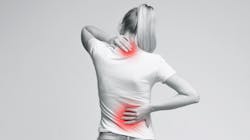Myth Busters: Taking care of yourself is overrated
Nobody in our office has time to slow down. We are so shorthanded. It’s important for me to see what’s going on in patients’ mouths, and that may mean standing for a long time or twisting my body to get a good view. There’s not much I can do about that. Right? Wrong!
Proper ergonomics, which means keeping your musculoskeletal system healthy, is much more important than you may realize!
At one time, I was a young dental assistant who thought I was invincible, like many of you still do, I’m sure. I wore cheap shoes, and I practically stood on my head to see in people’s mouths. I stood for long periods, and the worst thing is, I didn’t take care of myself. You see, I was a single mom, and I didn’t think I had time to take care of myself. I was the sole provider for my sweet little boy, and I worked like a dog to support us. Whatever needed to get done, I was determined to make happen. That meant working long hours and putting my needs last.
Fast forward to today, and I just celebrated 40 years in the dental profession. Forty years! The toll that the work has taken on my body is crazy. When we’re young, we don’t feel the burn. But as we age, aches and pains sort of creep up on us.
Here are some things I’d like to recommend to those of you who don’t take ergonomics seriously, plus a few other words of advice from this 40-year veteran.
Posture—This is very important. Try to stand erect and try not to lean over. Also, don’t just use one side of your body repeatedly.
Stretching—This can be a lifesaver! We assistants contort our bodies in many different positions, so we need to warm up our muscles and give them a good stretch. Having a daily routine can make a world of difference in how you feel. Yoga is a great way to loosen muscles and keep your body moving.
Shoes—Your feet align your entire body, so buy good shoes. And I don’t just mean expensive ones because those aren’t always supportive. Have your foot measured, then find a shoe that offers great support. Buy the good shoes and leave them at work, just for work. You shouldn’t wear them out in the rain, snow, and mud. This way they’ll last much longer, and your feet will love you for it!
Take a break—We’ve all had to endure those long procedures. It’s important to take a break, move around, and get your body going. If the doctor walks away to do something, then you should too. Rest is good for the soul and muscles!
Do you position you or the patient?—We often try to position ourselves to make it convenient for patients. Why? You should position patients so that your posture is the best it can be to keep you comfortable. Patients are laying down, so they’ve got it made. You need to make things easier on yourself.
Sit—I often hear assistants say they stand too long for many different reasons. When we stand for long periods of time, we lock our knees, put pressure on one side of the body, and tend to lean over, which puts undue stress on the back. Find an ergonomically designed chair, and then sit when you have the chance. A good chair will support you and help you reenergize.
Instruments—For whatever reason, I notice that sometimes I hold an instrument for dear life, as if someone is going to rush in and grab it from me. I must consciously tell myself not to grip so hard. This can be extremely hard on your hands and wrist. Loosen your grip, or put something down if you can, but make sure to ease up so you don’t cause undue damage.
Don’t look at the light—There’s an eye disease called macular degeneration, and it is damage that can be done to the eyes from looking at the blue light. Of course, this doesn’t happen overnight. That’s why we tend to say, “What’s the big deal?” But the truth is that over time, we’re damaging our eyes, and that can lead to a loss of vision. Always wear protection for your eyes. Always.
Breathe—These days some of us are doing the work of two or three people. So, take time out of your day, even it’s just for 10 or 20 seconds, to breathe. Oxygen is good for the body, and when you rush around, you don’t give yourself enough time to breathe. Try to fit in a deep breathing session every hour or so. For those of you who are smartwatch users, the watches have a setting that will remind you to set aside a bit of time to breathe. Deep cleansing breaths can calm your soul and work wonders for your outlook.
Take care of you—I used to think self-care was selfish. I mean, I had so much to do that there was just no time for me. Now I realize the best thing I could have done for my family was take care of me first. If you’re down, who’s going to take care of everything? Taking care of yourself is so important and it’s the best thing you can do for you as well as your family!
Bad things don’t happen to your body overnight. But when we adopt bad habits and keep repeating those bad habits, these take a toll on our minds and bodies. Take a breath, stretch a little, give yourself a break, and get some good ergonomic items and practices in place. Your body will be glad you did!
Tija Hunter, CDA, EFDA, CDIA, CDSO, CDSH, MADAA, is a member and current vice president of the American Dental Assistants Association (ADAA), where she holds the honor of Master. She is the editor of Dental Assisting Digest and contributes to Dental Economics magazine. Hunter is the director of the Dental Careers Institute, a dental assisting and dental continuing education program. She is an international speaker and a certified trainer in nitrous oxide in several states. She can be reached at [email protected].
About the Author

Tija Hunter, CDA, EFDA
Tija Hunter, CDA, CDIA, CDIPC, CDSH, CDSO, EFDA, MADAA, is a member and former vice president of the American Dental Assistants Association (ADAA), where she holds the honor of Master. She is the director of the Dental Careers Institute, a dental assisting and dental continuing education program, and the author of seven continuing education study courses. She is an international speaker and a certified trainer in nitrous oxide in several states. She can be reached at [email protected].
